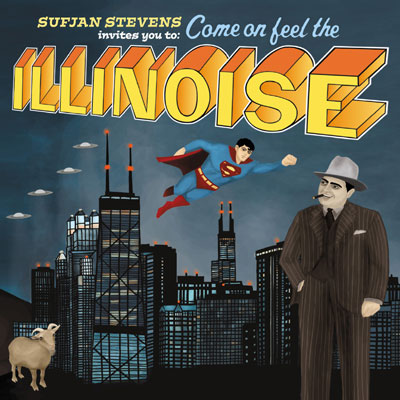Beautifuly weird

Illinois - 2005
If Sujan Stevens was to record and release one album for each state in the union per year, he would be around 78 years old
by the time he covers the entire United States. The 30-year-old former Detroit native and current Brooklyn resident has
already done two of them-Michigan: The Great Lakes State (2003) and his latest Illinois-that can be best described as
musical history and cultural lessons about those respective states. The 50 states projects is a daunting and even ridiculous
task by Stevens' own admission; yet given the scope of his artistic ambitions and peculiar obsessions, anything is
possible.
According to the official biography on his web site, the young Sufjan (pronounced Soof-yan) Stevens was a self-taught
musical prodigy who banged out sonatas on a toy Casio, and later became proficient on the oboe, recorder, banjo, guitar,
vibraphone, bass, drums, piano, and countless other instruments. With a four-track tape cassette recorder, he made 90-minute
concept albums about The Nine Planets, The 12 Apostles, and The Four Humors. Stevens later moved to New York City and was
enrolled in a writing program at the New School for Social Research.
Those literary aspirations, aside from his musical ambitions, reveal themselves on Illinois, a sprawling 77-minute,
22-track indie folk/rock/ambient opus about the historical moments and cultural landmarks that characterize the 21st state of
the Union: the 1893 World's Columbian Exposition, the Chicago Cubs, the cities of Jacksonville and Decatur, prairie fires,
and a UFO sighting near Highland. Some of Illinois favorite sons and daughters are name-checked throughout this ambitious
song cycle, including Abraham Lincoln, Carl Sandburg, Ronald Reagan, Jane Addams, Benny Goodman, serial killer John Wayne
Gacy, Jr., and even Superman ("The Man of Metropolis Steals Our Hearts").
In his research for the project (how many indie artists would invest the time in research?), the musician read from
biographies and history books, corresponded with family and friends from the state, and drew from his own personal
recollections (like in song titled "Chicago," in which Stevens and his friends drive through the Windy City in a van en route
to New York). All of those and Stevens' Midwestern background lend a distinct local flavor to the record. But Illinois is not
solely preoccupied with names and places; it also offers moments of personal and humanistic introspection such as a woman
dying of cancer in the deeply moving "Casimir Pulaski Day."
The album takes on an 'everything-but-the-kitchen sink' approach with its colliding sounds of keyboards, horns, strings,
banjo, and layers upon layers of airy vocal harmonies. Accompanied by a choir and a string quartet, Stevens plays numerous
instruments as earlier indicated (even the album sleeve notes cheekily comment about this with the tag "Oh Lord, help us!").
Stevens' painstaking dedication to studio craft and over-the-top arrangements makes him a musical mastermind on the level of Brian Wilson and ELO's Jeff Lynne, while his minimalist and avant garde tendencies are similar to that of the works of Steve Reich. The songs vary in styles and moods: one instance you'll hear an ambient work, followed by something coming out of a marching band, and then later a rustic folk tune. All of this may seem overwhelming and bombastic, but Stevens manages to rein it all in and creates something that is as somewhat cohesive as it is challenging. His whispery vocals stays subdued and detached throughout his storytelling.
You'll notice that there is a spiritual, almost religious, fervor over the course of the album; Stevens is a devout Christian whose last album was the biblical Seven Swans. That becomes apparent with lyrics such as "Lamb of God, we sound the horn/Hallelujah!/To us your ghost is born," not to mention the many mentions of "Oh"'s as in "Oh Great Heaven, oh Great Master," and "Oh Great Ghost, protect and save us." it's more like Stevens is expressing a sense of wonder than advocating a religious-based agenda. And while Illinois is serious and at times somber, it is not without a sense of humor; one of the album's instrumental interludes is titled "Let's hear that string part again, because I don't think they heard it all the way out in Bushnell."
For those expecting a conventional straightforward rock album, even by indie standards, Illinois can be a difficult listen on the first try. Once you get deeper into the album, it is a majestic work that's not just Midwestern in character-it addresses the human condition with its themes of faith, morality, fears, sorrow, and hope. As a chronicler of American people and culture, Stevens could arguably be the indie rock equivalent to author and oral historian Studs Terkel, who, by the way, is from Chicago.